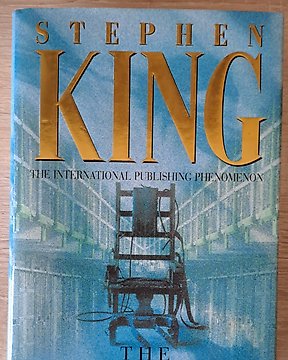
Stephen King - The Green Mile - 2000
Nr 83911663

Nr 83911663

"The Tenant of Wildfell Hall & Agnes Grey" by Anne Bronte and ill. by Edmund Dulac - J.M Dent, London - 1922 first Dulac edition - 18cmx15cm - condition: book in very good condition with all Dulac plate, in original dustwrapper with minor shelf wear
Agnes Grey, A Novel is the first novel by English author Anne Brontë (writing under the pen name of "Acton Bell"), first published in December 1847, and republished in a second edition in 1850.[1] The novel follows Agnes Grey, a governess, as she works within families of the English gentry. Scholarship and comments by Anne's sister Charlotte Brontë suggest the novel is largely based on Anne Brontë's own experiences as a governess for five years. Like her sister Charlotte's 1847 novel Jane Eyre, it addresses what the precarious position of governess entailed and how it affected a young woman.
The choice of central character allows Anne to deal with issues of oppression, abuse of women and governesses, isolation, and ideas of empathy. An additional theme is the fair treatment of animals. Agnes Grey also mimics some of the stylistic approaches of a bildungsroman, employing ideas of personal growth and coming of age.
The Irish novelist George Moore praised Agnes Grey as "the most perfect prose narrative in English letters,"[2] and went so far as to compare Anne's prose to that of Jane Austen. Modern critics have made more subdued claims admiring Agnes Grey with a less overt praise of Brontë's work than Moore.
The Tenant of Wildfell Hall is the second and final novel written by English author Anne Brontë. It was first published in 1848 under the pseudonym Acton Bell. Probably the most shocking of the Brontës' novels, it had an instant and phenomenal success, but after Anne's death her sister Charlotte prevented its re-publication in England until 1854.
The novel is framed as a series of letters from Gilbert Markham to his friend about the events connected with his meeting a mysterious young widow, calling herself Helen Graham, who arrives at Wildfell Hall, an Elizabethan mansion which has been empty for many years, with her young son and a servant. Contrary to the early 19th-century norms, she pursues an artist's career and makes an income by selling her pictures. Her strict seclusion soon gives rise to gossip in the neighbouring village and she becomes a social outcast. Refusing to believe anything scandalous about her, Gilbert befriends her and discovers her past. In the diary she gives Gilbert, she chronicles her husband's physical and moral decline through alcohol and debauchery in his dissipated aristocratic milieu. Ultimately she flees with her son, whom she desperately wishes to save from his father's influence. The depiction of marital strife and women's professional work is mitigated by the strong moral message of Anne Brontë's belief in universal salvation.
Most critics now consider The Tenant of Wildfell Hall to be one of the first feminist novels. May Sinclair, in 1913, said that "the slamming of [Helen's] bedroom door against her husband reverberated throughout Victorian England". In leaving her husband and taking away their child, Helen violates not only social conventions but also early 19th-century English law.
Jak kupować w serwisie Catawiki
1. Odkryj coś wyjątkowego
2. Złóż najwyższą ofertę
3. Dokonaj bezpiecznej płatności